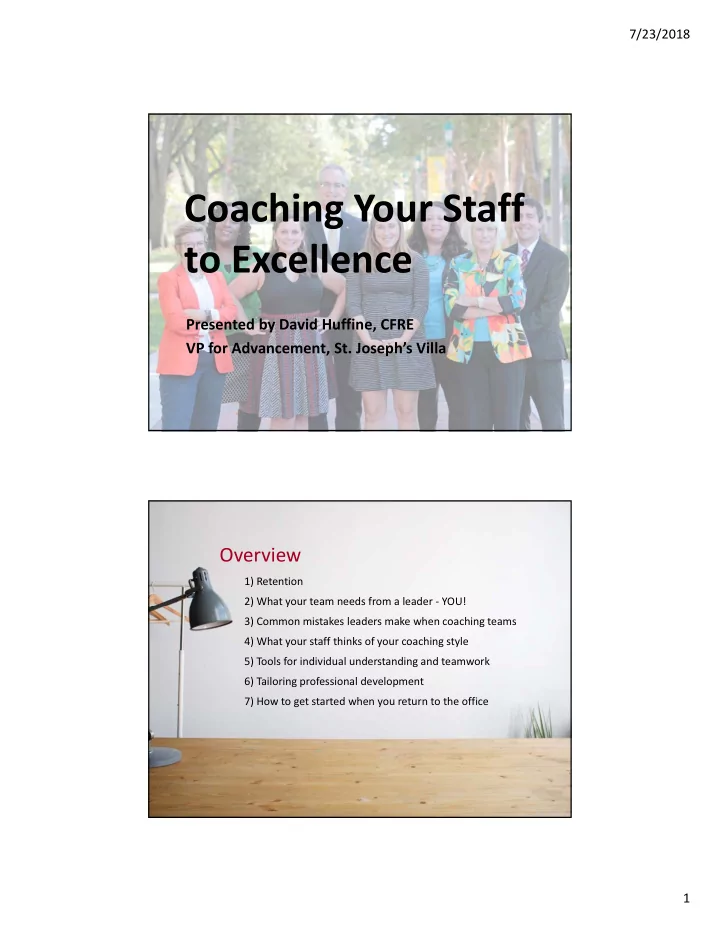

7/23/2018 Coaching Your Staff to Excellence Presented by David Huffine, CFRE VP for Advancement, St. Joseph’s Villa Overview 1) Retention 2) What your team needs from a leader ‐ YOU! 3) Common mistakes leaders make when coaching teams 4) What your staff thinks of your coaching style 5) Tools for individual understanding and teamwork 6) Tailoring professional development 7) How to get started when you return to the office 1
7/23/2018 The cost (indirect + direct) of replacing a fundraiser that leaves your organization $127,000 ‐ Chronicle of Philanthropy Why coach individuals? • Staff retention • Tangibly show you care about their career • Keep growing their skill sets, which benefits them and your organization • Establish a reputation for your team as a place where individuals thrive • Keep morale positive • Increase fundraising success! 2
7/23/2018 Lack of formal education and training: Why you need to invest in staff • How many fundraisers on your team went through a formal academic program for fundraising? • How much time do you spend on‐the‐job teaching those new to the profession about fundraising and best practices? • What credentials do your team members hold? (e.g., CFRE, ACFRE, CAE, AHP) • What is your annual professional training budget per person? Does it get fully used? • Do staff members currently have strong mentors? What your team needs from a leader – YOU! • Role‐modeling • Your thoughts, moods, and actions set the tone • Your level of professionalism should be exemplary, encouraging others to act and behave in the same manner • Distraction, lack of focus, and personal politics erode team spirit and productivity www.cfre.org 300 N. Washington Street, Suite 504, Alexandria, VA 22314 USA +1 703 820 5555 3
7/23/2018 One Fundraiser’s Professional Development Path • AFP • CFRE • VAFRE • Virginia Gift Planning Council • UR Institute on Philanthropy Advisory Board • Church boards • Lambda Chi Alpha Fraternity Board Importance of Being Impartial • Peace and harmony are ideal, but every team has conflict. • Conflict is a normal part of different people coming together and can be handled efficiently and professionally. • Cannot put off making decisions (or making tough decisions) just for the purpose of keeping equilibrium. 4
7/23/2018 Does your culture make people feel: • Safe or threatened • Free or constrained • Creative or status quo • Heard or voiceless • In control or an order‐taker • Optimistic or pessimistic • Supported or abandoned • Trusted or under suspicion • Valued or taken for granted Coaching staff to excellence actively creates a positive culture, which supports retention 5
7/23/2018 Common mistakes leaders make when coaching teams: One‐size‐fits‐all coaching Staff have different levels of: • Ambition • Need for responsibility • Need for recognition • People skills • Experience Coaches give the right amount of challenge • Interesting projects • Collaborative projects • Room to infuse new ideas • Taking on greater responsibility • Consistent, ongoing rewarding work 6
7/23/2018 What staff think of your coaching style • Are you genuinely interested in their path with weekly check‐ins? • Do you let the individual guide how far they want to go? • Is your organization willing to put dollars and time behind training? • Are you helping them map out a clear path forward within your organization? • Do you have realistic expectations? • Do you ask for feedback? What undermines trust in a coach • Only interested in what an organization needs from an individual, but not what an individual needs from an organization • Not setting clear goals for individuals that are mutually agreed upon and time‐bound • Meeting once a year for an annual review is not coaching • Gossiping about other staff • Openly comparing staff members to each other • Overemphasizing shortcomings 7
7/23/2018 Assessment Tools Why use one? • You will gain greater understanding of your team • Your team members will gain greater understanding of themselves • Your team members will gain greater understanding of each other Tool 1: DiSC: Four Main Attributes Plus Secondary Attributes www.discprofile.com 8
7/23/2018 Tool 2: Strengths Based Leadership Identifies three keys to being a more effective leader: • Knowing your strengths and investing in others’ strengths • Getting people with the right strengths on your team • Understanding and meeting the four basic needs of those who look to you for leadership Tool 3: Road Map 9
7/23/2018 Staff Retreat • Get out of the office into a neutral environment • Lose temptation to get into normal daily routine • Bring together staff who work remotely + in‐office staff • Use the time to problem solve and set your vision of the future 10
7/23/2018 Being Attentive • Active listening • Having a dashboard • Carving out time to meet individually with staff • One‐minute manager • Visibility • Accessibility/Open dialogue Set Your Plan Into Action • Honestly assess how much time per month you can put into coaching staff • Work with each staff member on a development plan • If staff already have plans, determine budget you can allocate to professional development per person • Reacquaint yourself with each staff person’s job description to determine if the role has changed since the initial hire and what the measures of success are for each person. 11
7/23/2018 Individual Meetings With Your Staff Set up a 45‐ to 60‐minute meeting with each staff person to uncover: • Why they enjoy working for your organization/what’s going well • What barriers they believe exist to making your team a high performing one • Offer recognition for work well done • Where they hope their current role will lead them within your organization • Re‐engage with assessment/roadmap • What gaps in knowledge they have that can be addressed via professional development • Speak up if you feel you’ve fallen short as a coach/leader • Actively listen/Ask open‐ended questions Stay in touch David Huffine, CFRE dhuffine@sjvmail.net 12
Recommend
More recommend